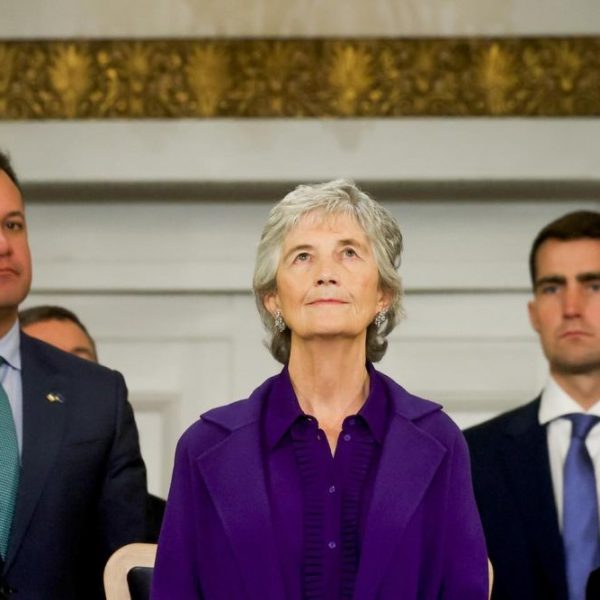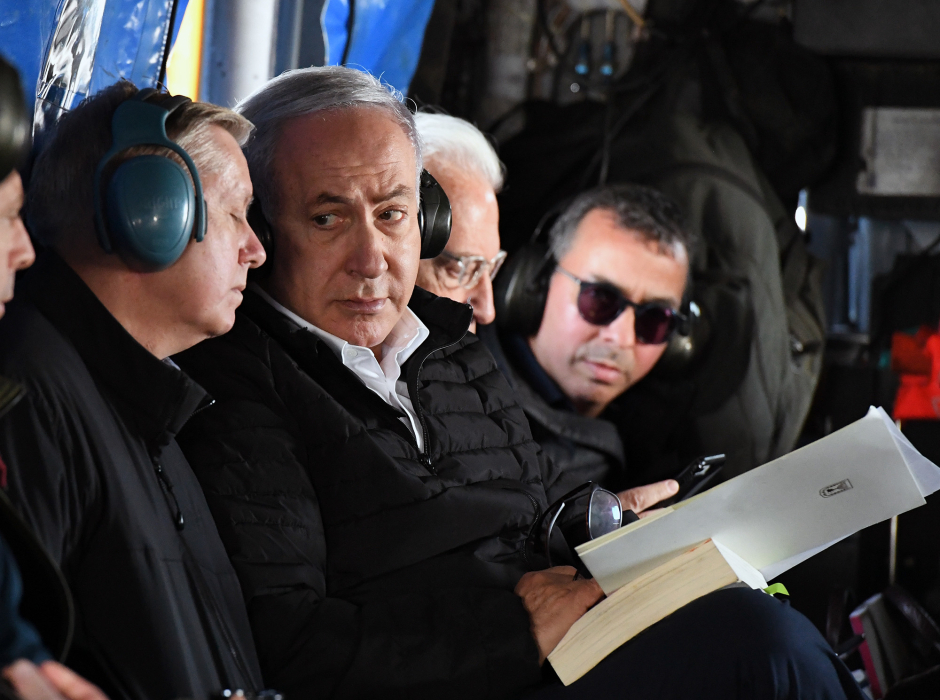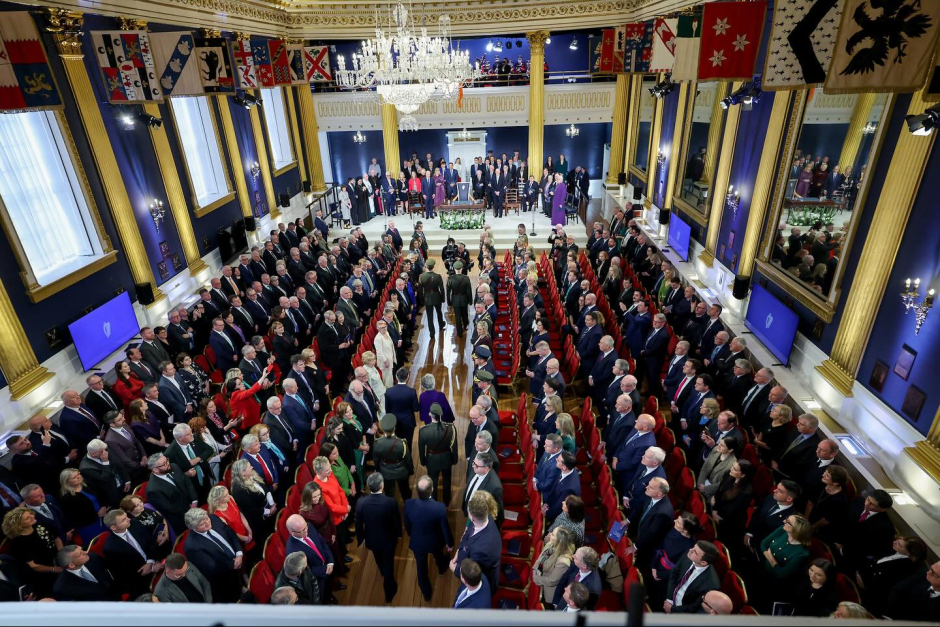
By Mick HALL
The outspoken new Irish president on Israel and NATO was inaugurated today and already the knives are out for her, writes Mick Hall.
As Catherine Connolly was inaugurated as Ireland's 10th president in Dublin Castle today, efforts intensified to undermine the country's neutrality as it weighs moves to punish Israel for genocide.
Connolly, 68, was elected after winning over 63 percent of the vote in a landslide victory last month, her robust defence of anti-war and anti-genocide positions resonating with the Irish electorate, while causing alarm in Western corridors of power.
These are signs that the victory of the anti-imperialist left has served to galvanise establishment forces, both at home and abroad.
A former White House national security advisor, Robert C. O'Brien, writing in The Wall Street Journal last week, warned the Trump administration would "no longer tolerate countries that reap the benefits of America's economic strength and military power, while pursuing policies that undermine American interests."
"Ireland's President-elect embodies the antagonism towards American interests," he wrote, adding:
"Ireland is finding its voice in international affairs, but it's one that seems increasingly hostile to US interests. Ireland is the most antagonistic country to Israel in the Western world... Ireland was one of the first Western democracies to recognise a Palestinian state unilaterally, and it is at the forefront of allegations of 'genocide' against Israel. Meanwhile Dublin courts Chinese investment with no mention of Beijing's human rights record, economic coercion or regional aggression."
In January, Ireland formally intervened in South Africa's case brought against Israel at the International Court of Justice (ICJ) which alleges a breach of the Genocide Convention. Ireland has also remained out of NATO, refusing to militarise with most of the rest of Europe.
Ireland is indeed facing growing pressure over its refusal to align with the imperial West. Even its civil society bodies are coming under scrutiny from U.S. neo-conservatives.
Graham Chimes In
Republican lawmaker Lindsey Graham over the weekend threatened consequences on the Football Association of Ireland (FAI), which voted overwhelmingly for its board to request that the Union of European Football Associations (UEFA) immediately suspend Israel from European competitions.
Members of Irish soccer's governing body had cited violations by Israel's Football Association of two UEFA provisions - to implement and enforce an effective anti-racism policy and Israeli clubs playing in occupied Palestinian territories without the consent of the Palestinian Football Association.
Graham promised to "make those who participate in this effort to marginalize Israel in sports, and elsewhere, pay a heavy price when it comes to access to the American economy."
In July, Graham also joined U.S. envoy to Israel Mike Huckabee and other U.S. lawmakers in criticising the Irish government's plans to ban trade with businesses operating within illegal Israeli settlements.
The Israeli Settlements in the Occupied Palestinian Territory (Prohibition of Importation of Goods) Bill 2025 was first tabled in 2018, passed by majority votes in both the Seanad (upper house) and the Dáil (lower house), but had been stalled by successive governments after "veiled threats" of economic consequences by U.S. lawmakers, which have included Irish-Americans like Peter King.
Graham in July said he hoped "Ireland will reconsider their efforts to economically isolate Israel."
"I do not believe these efforts would be well received in the United States and they certainly would not go unnoticed," he said on X.
The bill is expected to be watered down by the centre-right Irish coalition government, to head off coercive moves by the U.S.
Israeli Prime Minister Benjamin Netanyahu between U.S. Senator Lindsey Graham, left, and
U.S. Ambassador to Israel David Friedman, on a trip to the Golan Heights in March 2019 for a briefing by an Israeli military commander on the situation in the region (Matty Stern/U.S. Embassy Jerusalem)
Connolly a Formidable Anti-war Voice
What they may not be able to water down is the voice of Connolly.
She replaces Michael D. Higgins, another former Irish Labour Party member, who served two seven-year terms and whose criticism of Israel over the past two years contributed to Israel withdrawing its ambassador from Dublin in December 2024.
Connolly may prove even more strident in her public foreign policy positions.
In the lead-up to the Israel import ban vote on Oct. 24, she had pointedly criticised NATO "warmongering" and Israel's genocide in Gaza. She also voiced support for a border poll over Irish reunification, as outlined in the 1998 Good Friday peace agreement that brought an end to decades of political violence in the north of the partitioned island.
She told an often hostile media that Hamas formed "part of the civil society of Palestine" and that only Palestinians should choose who governs them, a rebuff to the Trump administration's 20-point neo-colonial 'peace' plan. Connolly bluntly stated that Israel was an out-of-control state committing a genocide.
When scrutinised over her attitude to the Western proxy war in Ukraine, the former barrister and psychologist said the conflict could only be resolved by diplomacy and that German rearmament reminded her of the military build-up in the 1930s.
Her elevation to Ireland's constitutional figurehead and its moral voice on the world stage was the result of a disparate opposition's ability to form a collective voting bloc, possibly learning from previous mistakes.
In June last year, Connolly joined a panel alongside other veteran activists, including former northern civil rights leader Bernadette Devlin Aliskey, in support of Clare Daly's failed bid to retain her European Parliament seat.
The staunch NATO critic lost, disadvantaged by smears carried by media outlets that suggested she was a Russian asset and by several other leftist candidates also standing.
This time, unity among the left saw Ireland's biggest party Sinn Fein, as well as Labour, People Before Profit and the Social Democrats, getting behind Connolly.
Getting her elected to what is largely a ceremonial role may prove vitally important as a means of countering pro-war and anti-genocide narratives in the country, which are being pushed heavily by establishment media.
From Threats to Threat Inflation
These narratives are now coming thick and fast.
A report entitled Peak Ireland by security-state aligned London think tank Policy Exchange, released on Oct. 30, argued that Ireland was freeloading "off the security umbrella provided by the US, the UK, and other European states."
But, it said, the country was vulnerable to U.S. tariffs and trade negotiation shifts, as it continued to challenge Washington's foreign policy settings. Its contents were covered by Ireland's major news outlets.
Interestingly, former U.S. national security advisor O'Brien wrote the foreword to the report.
In his Wall Street Journal op-ed, O'Brien too criticised Ireland's "pitiful investment" on defence, which amounted to 0.2 percent of GDP.
"Ireland lacks key technical defenses, like radar systems and efficient cyber and human intelligence networks, leaving the country open to espionage and cyberattacks from Russia, China and extremist nonstate actors," he wrote.
t.co pic.twitter.com/vvffBEnHrE- Barry Andrews MEP (@BarryAndrewsMEP) November 6, 2025
Several media outlets found ways of writing stories around these talking-points, referencing concerns by unnamed Irish and European military and security leaders about the country's ability to carry out security operations after it takes up the six-month rotational E.U. Presidency from July next year.
Of specific concern was Ireland's lack of radar and defence capability when hosting the European Political Community summit next year, usually attended by up to 50 leaders. It was reported that a delegation from an unnamed Baltic country raised concerns about security with Irish officials at a meeting in Dublin last month.
The stories were hinged, or maybe unhinged, on a manufactured fear that Russia is sending drones deep into European airspace to probe nations' defences as part of a hybrid warfare campaign.
Claims that drones were being launched from tankers used by Russia to transport its oil - its so-called 'shadow fleet' - were repeated uncritically. No evidence has been presented for this.
Mystery drones have recently closed Brussels Airport, with similar issues reported in Denmark in September.
The reporting forms a long line of narrative-driven stories seemingly designed to engineer fear and justify a more militarized and NATO-aligned stance by Ireland.
Ironically, Irish Defence Forces gave away its key radar systems used to direct anti-aircraft missiles, known as Giraffe, to Ukraine earlier this year. The Irish Times reported the Government is now purchasing at speed a multi-million Euro counter-drone system.
Neutrality Under Threat
The inauguration of Catherine Connolly. (Government of Ireland)
What lies at the centre of these propaganda pieces is a desire to bring Irish politicians and the public to an intellectual position the logic of which would undermine the rationale to retain the country's neutrality, a position it has maintained since the state was established in 1921.
In widely reported remarks in early November, Ukraine's first deputy minister for foreign affairs, Sergiy Kyslytsya, said neutrality was "a thing of the past."
Speaking at the European Commission's offices in Dublin, he warned Russia could flood far-off nations with drones or bring its systems down with cyberattacks. He suggested Ireland should follow the path of former neutral countries Finland and Sweden in helping to confront the threat.
Others have been even more forthright, expressing utter contempt for not just neutrality, but Irish sovereignty itself.
A former senior NATO commander, British Rear Admiral Chris Parry, last week told Westminster MPs and House of Lords members in a briefing that any future united Ireland would pose a strategic threat.
He said the loss of Northern Ireland would deepen the threat to Britain posed by Chinese and Russian submarines, and also recommended NATO hold naval exercises in Irish waters, whether Dublin agreed or not.
In a country like Ireland, with its bitter colonial legacy and where many keenly recognise Western war propaganda, comments from the likes of Parry may put accumulative pressure on the Irish government to compromise on neutrality, but such remarks will also likely antagonise large sections of the Irish public.
Unpicking Triple Lock
Key to dragging Ireland into NATO-captured EU security arrangements is the unpicking of its Triple Lock, designed to keep Ireland out of Western imperial interventions.
The Triple Lock means no more than 12 Irish Defence Forces members can be sent on an overseas mission, unless there is a United Nations Security Council mandate, approval from the Irish government (Cabinet), and approval from Dáil Éireann (the Irish parliament).
The Irish government therefore cannot move unilaterally, even if it manages to get a majority vote through Parliament and regardless of how much pressure is exerted from the E.U. and powerful NATO countries to circumvent the U.N.
European NATO nations are pushing plans to insert 'peacekeepers' into Ukraine, an arrangement Russia has signaled it will reject as part of any negotiated peace settlement.
Taoiseach (Irish Prime Minister) Micheál Martin discussed peacekeeping and prospects for a ceasefire with Zelensky by phone in September.
Although the Irish Government has not linked the two issues, it may not be a coincidence that it is bringing forward legislation to ditch the need for a Security Council mandate for peacekeeping missions, making it a Double Lock instead.
Connolly herself could speak out over the issue, putting pressure on the Government to agree to a referendum to change the Triple Lock, something the Government claims is unnecessary, as it supposedly does not compromise neutrality.
Connolly cannot legislate, only exercising discretional powers like the ability to send a bill to the Supreme Court to test its constitutionality. But there is nothing in the Irish Constitution that restricts anything she says in public.
One Irish outlet has reported the Government is planning for a visit from Zelensky, possibly in December. It remains unclear whether Connolly would receive him in the event of any such visit. If she did, there would be a risk for both parties.
A public engagement would invariably be used to put further pressure on Connolly to assume a more NATO-friendly position.
However, Zelensky risks being told some home truths in front of any cameras, primarily that diplomacy is the only way forward and that any other approach, including inflating threats posed by Russia, carries the unacceptable risk of an all-out war between European nations and Russia.
Connolly will likely act as a necessary and principled political bulwark against attempts to further propagandise Irish society and browbeat its population into renouncing its anti-colonial and anti-war instincts, as NATO threatens to consume it.
Original article: consortiumnews.com

